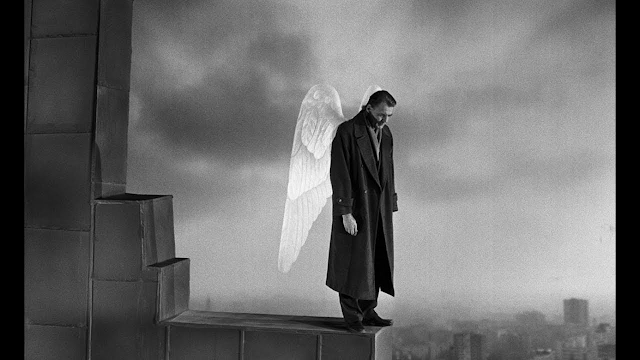Culture Thursday: My favorite film
This is, of course, a valid statement. For a relatively young art form, film has produced works of depth and profundity to match literature and music.
I could rattle off a few of my favorites. Metropolis. Citizen Kane. Dr. Strangelove. The Godfather. The Godfather, Part II. Apocalypse Now. And on and on.
But, in my heart, there is only one film which sits atop my list.
Wings of Desire, by German director Wim Wenders, was released in 1987, two years before the Wall fell. It won the Oscar for Best Foreign Film. I will try to explain why for me this is the greatest film I have ever watched, or ever hope to watch.
A quick synopsis: Two angels, Damiel—played by the incomparable Bruno Ganz, pre-Downfall—and Cassiel guard over the citizens of West Berlin; they are able to hear their thoughts, and spend their days documenting them. They can't be seen or felt, except by children. Damiel sees a beautiful trapeze artist, played by the too-soon-taken-from-us Solveig Dommartin, and falls in love with her. He surrenders his immortality and falls to earth, wanting no longer to be a passive observer, unable to affect the world, and be fully in it, savoring its joys and sorrows. When I said that only children could perceive angels, that's not quite true. The late, great Peter Falk plays himself, in West Berlin for a film role. Although he can't see Damiel, he can sense him, and talks to him.
Now, what do I love about this film?
First, the cinematography. It is shot in glorious black and white—that is, until Damiel becomes human. Then, in homage to The Wizard of Oz, it transitions to beautiful color. Now in the world, Damiel gets to experience it fully.
Damiel. I've often spoken about the Catholic theological tradition of the felix culpa, or "fortunate fall". Damiel giving up being an angel is a variation on this. But whereas Adam's fall was necessary for Christ's sacrifice, Damiel falls of his own accord, to be part of the world, because he loves the world so much, and the humans who inhabit it. This love of humanity, frail and blazing in equal measure, is the film's great theme. If you're going to describe it in one word, it is a "humanist" piece of art, placing fallible, wonderful humanity at the center.
The city of West Berlin. As a West German filmmaker, Wenders turned the city into a main character. This was a city still half in ruin, forty years after the war. But even in ruin it has a beauty to it. It also serves as a reminder as to what happens when a people loses its humanity.
Peter Falk. I mean, if any adult human being would have the sensitivity to sense an angel's presence, it would be him. He's in the film for only a few scenes, but the scene where he finally meets the now-human Damiel is worth the price of admission.
The joy and the sadness. Wenders captures the sadness of a country and a world still coming to terms with the horrors of the Second World War, and the further horrors of the long, twilight struggle of the Cold War. But the film is mostly a film of joy, of delighting in being human, of Damiel tasting coffee for the first time. In the film, heaven is grey and monochrome, whereas being human is filled with pain and suffering, with delight and ecstasy.
Wings of Desire is available on the Criterion Channel, which is a streaming service I highly recommend. You can also buy the Criterion Collection DVD on their website. And, of course, you can mosey on down to your local library and check it out.
***
Like what you're reading? Never miss another post! Get notified via email here.
Donate at the link below to keep us going.
